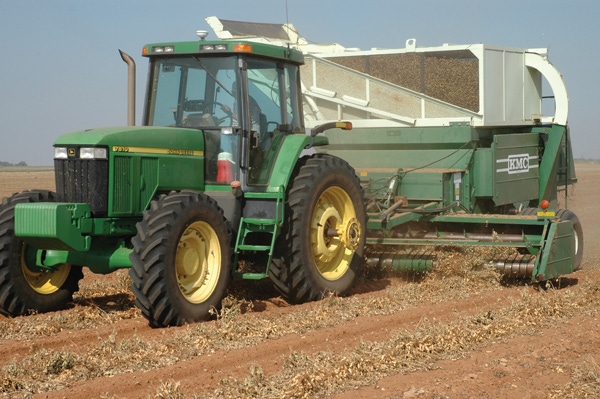
Variety selection may be the most important decision a peanut farmer will make in planning for the 2011 crop.
“Yield and grade are the top considerations,” says Oklahoma State University Extension peanut specialist Chad Godsey. “But it’s important to diversify to consider disease tolerance, planting date and harvest time.”
Godsey reported on 2010 variety trials at the recent Oklahoma Peanut Expo at the Quartz Mountain Resort near Lone Wolf.
He said farmers should consider field history, production experience and variety trials before selecting varieties. “Also, look at results from multiple years,” he said. He prefers at least three years of data before farmers commit to significant acreage.
In 2010, Oklahoma peanut farmers planted more Spanish peanuts than any other market type. “Spanish peanuts accounted for 44 percent of Oklahoma’s peanut acreage,” Godsey said. Runner types and Virginia types each accounted for 28 percent of the acreage.
Godsey reported on 2010 trials from four locations—Beckham County, Caddo County, Custer/Blaine County and Love County. He tested runner, Virginia and Spanish varieties in all locations. “Weather conditions were good for peanut production in 2010,” he said.
In Beckham County, average yield for the runner test was 5,257 pounds per acre. Grade average was 72 percent total sound mature kernels (TSMK). “No significant differences were observed among the runner varieties,” Godsey said. “Red River Runner (a new release) and Flavor Runner 458 were the highest grading varieties. The higher grades for these two were also observed in 2009.”
Average yield for Spanish peanuts at the Beckham County site was 4,657 pounds per acre; grade averaged 70 percent. ARSOK-S1 (experimental variety), Tamnut OL06 and Tamspan 90 were top yield performers. “ARSOK-S1 and Tamnut OL06 routinely perform well in Beckham County,” Godsey said.
The Virginia test averaged 3,786 pounds per acre and 67 percent TSMK. “Yields and grades were lower than normal due to pod rot problems. We saw no significant difference between varieties.”
In Caddo County, average runner yield was 4,145 pounds with an average grade of 68 percent. Tamrun OL02, GA-09B and Red River Runner were top yielders. Red River Runner had the highest grade.
Spanish yield average was 3,887 with an average grade of 66 percent. Spanco and ARSOK-S1 were top yielding varieties.
Anomaly
“Spanco is an anomaly,” Godsey said. “It is not available in 2011. Better varieties are available.”
Virginia yield average in Caddo County tests was 3,839 pounds per acre with a 64 percent grade. “Yield and grade were hurt by pod rot,” Godsey said. “GA-08V was clearly the best variety in the 2010 Virginia test.”
The Custer/Blaine County test, located in Hydro, produced an average of 6,787 pounds in the runner trials. Grade averaged 68 percent. “Tamrun OL07 performed very well at this location and graded similar to other top yielding varieties,” Godsey said.
“Yields for the Spanish varieties were excellent,” he said, “approaching yields for the runner varieties.” Average yield and grade were 5,940 pounds per acre and 65 percent. AT 98-99-14 and Spanco were top yielding varieties.
“AT 98-99-14 has a runner growth habit but is typically graded as Spanish. It has consistently yielded well in this region.”
For Virginia type peanuts, average yield at Hydro was 6,128 pounds per acre. Grade averaged 67 percent. “Pod rot incidence was high but yields were still good,” Godsey said. That pod rot infestation prevented identification of significant difference in varieties. “But GA-08V performed well.”
The test in Love County was the first trial for the location. Average runner yield was 4,569 pounds per acre. Grade averaged 71 percent. Top varieties included Red River Runner, Tamrun OL02 ARSOK-35-1 and GA-09B. “Red River Runner also had an exceptionally high grade, making it by far the most profitable variety in 2010.
“Yields for Spanish varieties were also good.” Average yield for Spanish varieties was 3,985 pounds per acre with a 63 percent grade. Spanco was the highest-yielding Spanish variety.
Virginia types averaged 3,474 pounds per acre and 63 percent TSMK. “Pod rot incidence was not as high as other locations but still present,” Godsey said. “GA-08V was by far the best performing variety in both yield and grade.”
Godsey said both of the Georgia varieties, GA-09B (runner) and GA-08V (Virginia) performed well in 2010 trials but he cautioned growers that they have been tested in Oklahoma for only one year.
He encouraged growers to diversify varieties and to pay close attention to planting date and conditions. “Set a yield goal and stay with your plan,” he said. “That’s the recipe for success in 2011.”
About the Author(s)
You May Also Like






